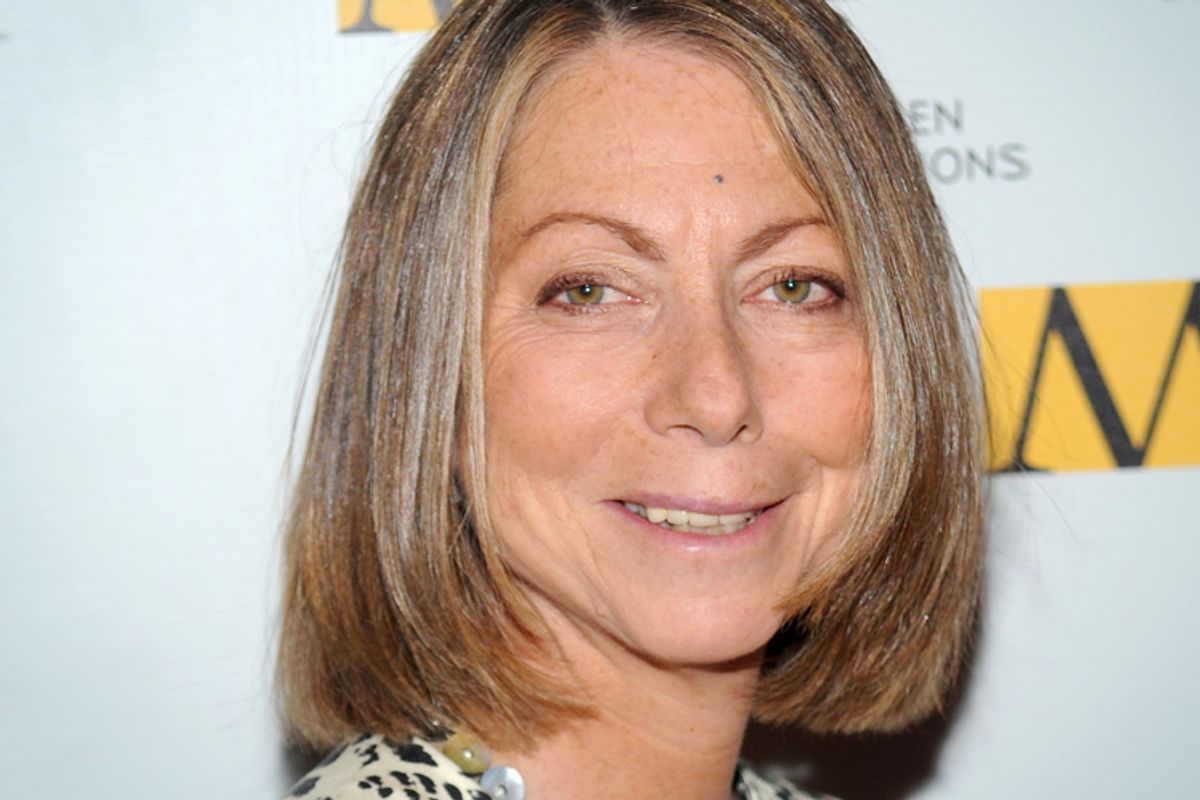Despite a lot of heavy speculation, no one knows the exact circumstances behind Jill Abramson's abrupt departure from her spot as executive editor of the New York Times. But we don't actually need to know whether Abramson was forced out because she inquired about alleged pay discrimination in order to know that sexism absolutely shaped how all of this went down.
It is ridiculous to pretend otherwise. Talking about the challenges Abramson likely faced as the first female executive editor in the paper's history -- and the marked difference between her exit and her predecessor's exit -- isn't a "social justice" narrative of her tenure, it's just a living in the world and paying attention thing. Which is why it's puzzling to see people like Dylan Byers object so strongly to the pretty uncontroversial claims being made right now about Abramson, sexism in the media and women and power in general.
Abramson was the first and only woman to serve as executive editor in the paper's history. Not to put too fine a point on it, but that means that for close to two centuries, the Times did not feel there was a woman capable of leading the newsroom. From the start, the expectations for Abramson were bigger than her or the job -- they were part of some sweeping historical narrative about progress and equality and women's capacity to lead. She was a person and a boss and a symbol. It's easy enough to imagine how -- given the heady mix of bottom line responsibilities and grand narratives about women and power -- Abramson would struggle to strike the proper balance with her staff.
Reports on her time as executive editor pegged her as condescending and kind of mean. And most of those characterizations seemed colored by sexist generalizations about how men and women are allowed to exist in the world. The kind that label women pushy while men get called straight-shooters. Where punching a wall in anger is an act of masculine virtue, but having your lawyer ask about your predecessor's benefits package is an "issue with management."
It's difficult to name a powerful woman who hasn't been criticized for her leadership style or whether she was a good mother/bad mother/not relatable because she wasn't a mother or any of the other moving targets that women in all kinds of positions of power must hit, time and again. When I think about it, I come up with Ellen DeGeneres and Oprah. DeGeneres dances with her audience for a living and Oprah gives away cars. Unfortunately, Abramson couldn't do either as executive editor of the Times.
Abramson may have been an awful boss. She may have had a nasty desk-side manner. But as Olga Khazan at the Atlantic notes, being a terrible dick does not generally get men fired. The same can't be said for women. And rumors about pay disparities at the Times are at the moment just that -- rumors. But pay disparities among male and female editors in newsrooms across the country are well documented. As we all sit here and mull the details, Abramson must also be curious herself about how much of her tenure was defined by her actual job performance and how much was defined by the institutional and deeply embedded cultural forces that were and remain much larger than her. That's how sexism works. It forces women into a never-ending game of asking themselves, "Am I imagining this or is it happening? Is it me or is it something else?"
And this is what seems to consistently evade men like Byers and the others who roll their eyes when questions of sexism and misogyny are raised in Abramson's rise and fall. This isn't an individual case, but part of a broader cultural and political context that leads all but the most stubborn of media critics to conclude that sexism continues to shape women's career prospects. Abramson could have been a genuinely unlikable boss and her dismissal could still be a case of gendered double standards determining the boundaries of what a woman in power can and can't do. What media institutions that are slow to change can and can't tolerate.
We probably won't get a satisfying answer about why Abramson was pushed out after just three years, but we do have a pretty astounding amount of data and social science and anecdotal experience to back up the fact that it was probably very hard for her to be the first and only woman to lead the paper. But this all remains open speculation, of course. That's fair enough. But allegations of sexism -- at the Times and in the media in general -- may be easier to disprove if we had a larger sample set of female executive editors to draw our conclusions from. But we don't. It may be redundant to point out why.

Shares